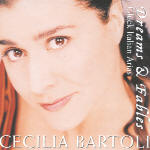Decca gives La Bartoli the full treatment here–flattering soft focus cover picture, heavy cardboard housing instead of the chintzy jewel box, a catchy if meaningless title (i.e. Dreams and Fables), a 58-page booklet with full texts and translations plus reproductions of fascinating old prints, and orchestral support from one of the better period-instrument groups. It’s very classy, and well deserved too, not just for Bartoli’s often thrilling singing, but also for dear old Gluck: six of these arias from rarely-heard operas are purported to be “world premiere recordings”. These pieces whet the appetite for hearing the full works–composed between 1748 and 1765 to librettos by Metastasio–and give us a strong hint of the glories buried in these long-forgotten operas.
Three of the arias are drawn from La clemenza di Tito, a revision of whose libretto was used by Mozart. “Tremo fra’ dubbi miei”, which opens the disc, is wild, full of trumpets and timpani depicting Vitellia’s madness. “Ah, taci, barbaro … Come potesti, oh Dio!” has Vitellia swinging between rage and terror, emotions Bartoli expresses with fiery pyrotechnics. She switches to the character of Sesto for “Se mai senti spirarti sul volto”, a long, complex scena that includes a love song whose gently rocking melody can remind you of the melodic shape of parts of Orphée et Euridice.
Throughout, Bartoli’s in magnificent form, making you tingle at the unbridled fury she displays in “Misera, dove son! . . . Ah! non son io che parlo” from Ezio, full of rapid-fire volleys of coloratura; and when she sings of stormy winds in “Quel chiaro rio” from La corona she makes you want to huddle next to a warm fireplace. By turns she pleads, regrets, is consumed by guilt, and flames with anger. Don’t expect 18th century opera seria to reflect genteel powdered wigs and snuff-sniffing–these arias aren’t for the faint-hearted and Bartoli sings her heart out in them, convincing you of the greatness of the music as well as of the singer.
But important as this disc is, it’s not a totally unmixed pleasure. You may admire the beauty of the voice, the virtuosity of the singing, and the completeness of the characterizations while resisting, nay, detesting, the mannerisms that so often infest many of Bartoli’s discs (not to mention the horrendous mugging in which she indulges on stage, both in opera and in recitals). Examples of such annoyances come in “Di questa cetra in seno” from Il Parnasso confuso, where her singing of the line “Vieni, e t’ascondi, Amor” includes tone production akin to squeezing the last drops of toothpaste from the tube; and that repeated line also is disfigured by crooning whispers that come and go like bad dreams. However, the aria also includes some terrific trills that almost compensate. Fortunately, the aspirated runs and runaway staccato singing that drove me from the hall at her New York Vivaldi recital and made me cringe while listening to her Vivaldi CD are absent. The Il Parnasso aria is the second on the disc, early enough to make me reconsider whether I could make it through to the end.
I realize these are very personal reactions that may possibly be shared by perhaps a dozen other people in the Western world, but they’re worth mentioning if only to explain why I could not go whole hog and give the lady a 10 for artistic merit. The good news is that aside from a stray moment or two elsewhere on the disc she stays on the right side of the boundary that divides musicality from affectation, singing gloriously enough to overcome my prejudices, allowing me to revel in the voice and the song. And let’s not forget the superb playing by the Berlin players–warm and vibrant, perfectly complementing the singer. [10/18/2001]
































